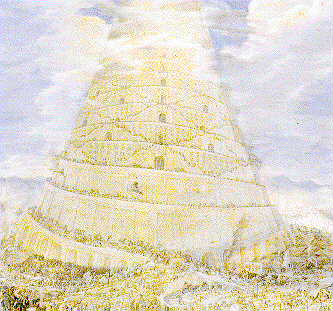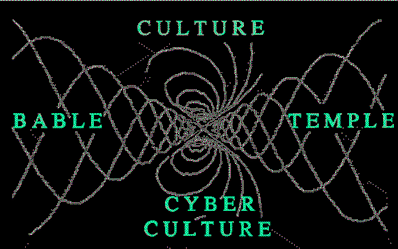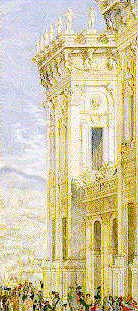


| THE INTEGRITY PAPERS | Genre - H Benking US Website | ceptualinstitute.com |
The Predicament of
Humankind:
A SECOND FLOOD, A THIRD BOMB or
A FOURTH REALITY ?
Heiner Benking
1997
Humankind is in the EYE of another storm, a second VORTEX
or threshhold. It needs to decide where to go, which actions to take and which values to
cherish. One way might be leading towards light, ethics and harmony, the other to the
contrary. With modern civilization and technology another trial becomes more obvious
every day. How to combine real and digital/multi- medial worlds, how to live in imaginary
or ideal worlds parallel to the physical environment, how to communicate about these new
'realities' and share impressions, proportions and consequences of action and inaction.



There is some tendency to go back to 'square one', returning into a
pre-industrialised society. But the status quo or a certain point in the past seems to be
hard to maintain or impossible to establish, given the status and dynamics of the world
and its change (population density, environmental impact, human attidudes, values and
tolerance). Some experts even maintain that Cyberculture will definitely accelerate the
loss of meaning and context. They phrased and predicted a 'SECOND FLOOD'
(Ascott/LÚvy), like Einstein called the impact of modern information and media the 'THIRD
BOMB', predicting irreversible development and lasting impacts. Their prophecy is
that this predicted flood has no tides, so there is no point going back to some mythical
'normal'. Therefore they see the nightmare of cultural catastrophy with no exit points or
changing qualities and trends (CEC report "THE SECOND FLOOD - IMPACT OF
CYBERCULTURE" {CC_CULT (96)27B, August 1996}).
The author is not willing to accept projections without perpectives to alter and modify
such fate, such pessimistic visions or views. As we have to create and design FUTURES, we
cannot allow a fatalistic extrapolation of trends becoming the standard or accepted view
about what a technology driven future will have in store for us. We have to face and
tackle for us and our children's children the challenge at hand. As media and the modern
data-information- and communication-technologies are central to what is going on, it seems
advisable to have a look at what we learn when we study media and communications. The text
books introduce different qualities and outreach of realities: The first reality
is the reality of our natural environment, the second reality is what is
'aired', what is sent all over the world on all channels and through all media, the third
reality is our personal, private, and individual reality, what you select and
take in as information from channel selections .... not the miriad of messages, but what
is really taken in and influences you. What seems to be missing is the "next
step", the idea of jointly constructing shared realities in common frames of
reference - a fourth, shared, mutual reality.
The author has proposed -- in addition to the filter and broker systems for knowledge
access and distribution as currently developed with high priority -- a concept of maps,
filters and brokers (PAKM 1996). As we need to not only chart and compass, but also
to captain, we need a host of ingredients for proper orientation and navigation. Using our
experience to find and map territories, we might not only be able to share landscape
realities, but also the process-scape and mind-scape realities. This will help us know
where we are without disorientation. The moment we landmark and anchor points, we have our
hold and orientation and need not worry about qualities of information, because
that is what humankind is good at -- filtering out unwanted information, closing the eyes
and ears.
There were common frames of reference before. When living in the family, the village, the
same region, the common ground was stable enough to be understood, at least to a certain
degree. What was up and might be going on for fellow human beings; not being able to
understand all, but to risk an educated guess what our companions had in mind. This
is not so in modern global society. Our context, cultures and value sytems are so
different that we can only refrain to 'tolerance towards intolerance' (Lord Menuhin) or
giving up. So, how can we establish a 'tolerance towards intolerance'? We
either have to develop some overview, to see things in perspective, see position, levels,
and situations in their context and how they relate or develop compassion, loving and
feeling with the fellow human being, whatever and whereever and whyever.
This proposal, arriving from multi-lingual, multi-cultural dialogues, cultivates first the
art of listening -- conversation in its purest sense -- but then goes on to share where
the fellow human being is (physially, conceptually and emotionally), and does not take the
basic teleological questions like: where?, why? and where to? in a vague and
subjective/indifferent sense, but in the sense of shared frameworks. In such an
anticipated schema it becomes possible and natural to discuss the area, neighbourhood and
distance of subjects, angles, positions, levels, focus, and perspective not in an abstract
meaningless sense but in an embodied, solidified and fuller sense Such embodiment also
comprises the embodiment of words and concepts. Taking words into space and making
them grok, gope and grippable. Like in many languages the term, the understanding and the
giping and grasping has the same root. In short: We are talking here about a framework or
anticipatory schema for being and sharing concepts, context and meaning. See the
MetaParadigm work in progess.
Links
Photo & Links (European Net-Homesite)